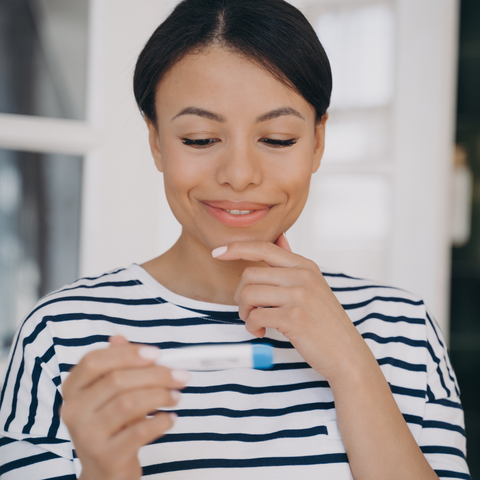When you’re knocking boots in an effort to get knocked up, timing is everything. Your best chance of conceiving is during the most fertile time of your menstrual cycle—when you ovulate. The key is figuring out exactly when that happens. Fortunately, you have a few ways of detecting ovulation. Here’s what to know about understanding ovulation and timing sex for pregnancy.
KEY TAKEAWAYS
- Most women ovulate 14 days before the first day of their period.
- Because sperm lasts up to five days in the body and an egg ready for fertilization lasts up to 24 hours, the window for pregnancy is generally about six days long.
- Familiarizing yourself with your own cycle can help you establish a reliable timeframe for ovulation so you can better time sex.
- If you’ve been trying for longer than six months, speak to your doctor to rule out potential fertility issues.
Fertility & Your Cycle
As we’ve established, the most fertile time in a woman’s cycle is around ovulation, which is when a mature egg is released for potential fertilization. Interestingly, ovulation tends to happen about 14 days before your period begins, and that’s pretty darn consistent regardless of cycle length. Remember, day 1 is the first day of your menstrual flow. The rule of thumb is to subtract 14 from your typical cycle length for a ballpark estimate of ovulation (i.e. day 21 if you have a 35-day cycle, or day 7 if you’re on the shorter side with a 21-day cycle).
To become pregnant, this mature egg needs sperm. An egg survives between 12 and 24 hours following ovulation, while sperm has a longer lifespan in the body—between 3 and 5 days. That means a woman’s peak fertility window is about six days long (up to five days before ovulation and about a day after), during which she has the best chances of conceiving. Most experts recommend having sex either every day or every other day during this six-day window.
Quick note here: if you’re timing sex for the best chance of conception, you should definitely be taking prenatal vitamins. And that goes for the both of you! Women and men alike benefit from a daily supply of key micronutrients to support their fertility health during this preconception stage, and we’ll happily plug our own Beli for Women and Beli Vitality for Men™.
Our women’s formula includes bioavailable forms of B6 and B12, two vitamins that work together to help promote regular ovulation. That’s in addition to ingredients like folate and choline, two nutrients that are absolutely essential during the earliest days of a pregnancy, as well as a number of other vitamins, minerals and antioxidants to promote egg quality and help balance hormones. On the men’s side of things, daily supplementation with a male prenatal vitamin is a simple way to support sperm health during the maturation process.
Detecting Ovulation
If your approach to tracking your periods is an asterisk on your calendar, it’s time to get a little more organized. Properly tracking your periods makes it much easier to establish a reliable timeframe for ovulation. Once you have that, a little detective work can help firm things up. In addition to self-detecting strategies, there are a ton of tools and devices on the market.
- Tune into physical changes.Some women experience physical signs of ovulation, including light spotting, breast tenderness, bloating, or abdominal cramping. The key is paying attention to what’s normal for you and jotting down some notes every month so you can look for patterns.
- Pay attention to changes in cervical mucus. The consistency of vaginal discharge changes throughout the month. Before you ovulate, it’s usually dry and sticky. It can get a little creamier as you get closer to ovulating and then, generally a day or two before you ovulate, it tends to go clear and kind of thin and slippery, similar to egg whites. Again, keeping track of what’s typical for you can be a good way to identify patterns in your own cycle, but alas, it’s not fool-proof.
- Try an ovulation predictor kit. As the name suggests, these home tests can help you predict when you might ovulate. They measure luteinizing hormone (LH) in your urine. This hormone ticks way upward around the middle of your cycle in preparation for the releasing of an egg. After the rise in LH, which can last up to 36 hours, ovulation typically occurs 12 to 48 hours later. That means the test is only positive for one to two days. Big caveat here: Ovulation predictor kits aren’t always reliable, especially in women who have polycystic ovarian syndrome (PCOS).

It’s important to clarify a few things. You can track your cycle religiously and follow directions for fertility tracker and ovulation predictors to letter and still not get pregnant. If you have erratic periods, spending time and money on this stuff is probably a waste. Instead, you should speak with your OB-GYN or a reproductive endocrinologist for a better idea of what’s going on. That’s actually a strategic move for couples who have been trying unsuccessfully to conceive for longer than six months. The same is true if you’re younger than 35 and you’ve been trying for a year. In that case, the issue probably isn’t timing sex properly, and it’s important to be clear about any potential fertility issues.
The Takeaway
Timing sex to ovulation is the key to successfully conceiving, so tuning into your cycle is a great starting point when you decide the time is right for a baby. Pay attention to what’s normal in your cycle from one month to the next to pick out patterns, get started with those prenatal vitamins, and if you have questions, ask! It’s never a mistake to turn to the experts for advice and reassurance about conception and pregnancy.

Article Resources
- Whelan, C et al. (2022). What are the signs and symptoms of ovulation? https://www.healthline.com/health/womens-health/ovulation-symptoms


